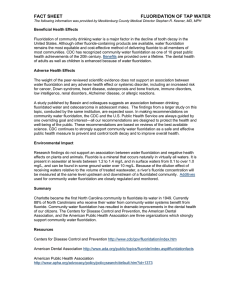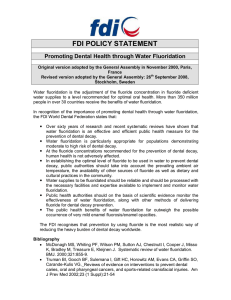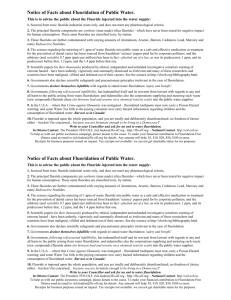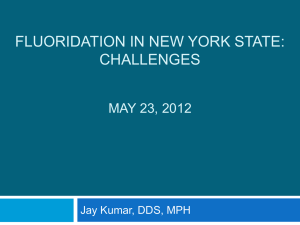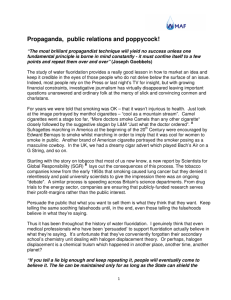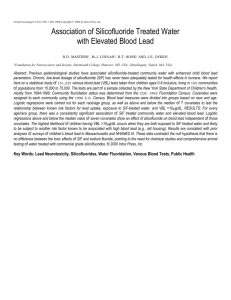Mitchell Presentation
advertisement
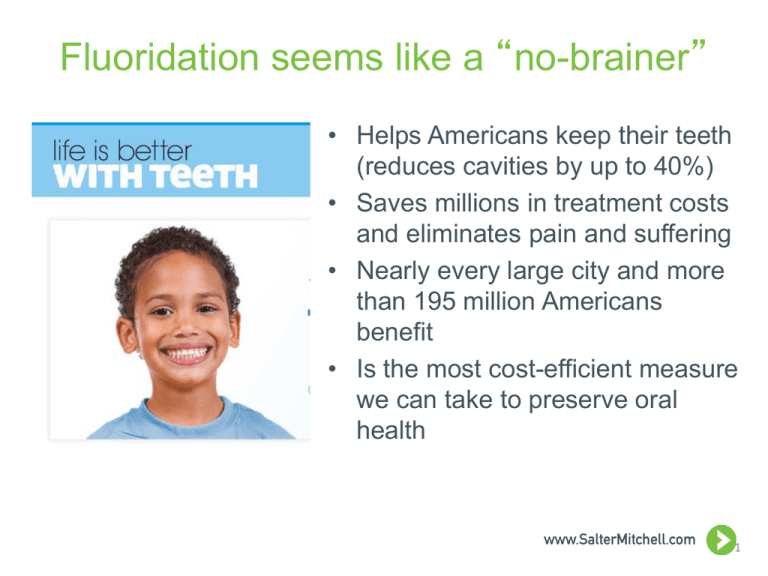
Fluoridation seems like a “no-brainer” • Helps Americans keep their teeth (reduces cavities by up to 40%) • Saves millions in treatment costs and eliminates pain and suffering • Nearly every large city and more than 195 million Americans benefit • Is the most cost-efficient measure we can take to preserve oral health 1 A standard public health strategy Fluoridation is one of many public health strategies used in the U.S. • Adding iodine to table salt • Adding Vitamin D to milk • Adding chlorine to drinking water and swimming pools • Adding folic acid to breads and cereals Supported by all major health groups • American Academy of Pediatrics • Institute of Medicine • American Dental Association • American Public Health Association • Centers for Disease Control and Prevention • National Consumers League • American Academy of Family Physicians • American Medical Association • American Academy of Physician Assistants • U.S. Task Force on Community Preventive Services • American Association for the Advancement of Science • World Health Organization • Office of Health Affairs, U.S. Department of Defense • American Academy of Public Health Dentistry • Council of State Governments • American Society for Clinical Nutrition • Florida Department of Elder Affairs • The Linus Pauling Institute The CDC has named fluoridation one of “10 great public health achievements of the 20th century” Already the norm in most places So why not everywhere? 1. Well-organized opponents Activate a National Network Add Credible Partners Aggressively Use the Web Spin the Science 2. We forgot what a difference it made Support among younger people Support among older people Most people support community water fluoridation. But younger people – born after fluoridation was commonplace – are less supportive than their older counterparts. 7 3. How the issue is framed • Main frame: Debate. • 4 of 5 front-page stories focused on debate over fluoridation safety. • Toxicity, danger and cancer are most frequent “anti” arguments • One-note proargument: Fluoridation good for your teeth 8 4. The impact of the internet “I was looking through the stories trying to figure out what to read and at the top they had a headline that added a negative word to it, so I clicked that instead.” (FL respondent.) 9 5. People don’t feel well informed • Over half of all respondents said they are only somewhat informed when it comes to fluoridation issues. How informed on CWF? Very informed Somewhat informed Not at all informed Total Sample (n=1503) 20% 54% 26% 80% not very informed … and policymakers are no exception 11 6. Anti’s “warnings” are sticky 12 What We Can Do • Focus on the real issue: Our teeth and the America’s oral health challenge. • Inoculate decision-makers: – Remove the element of surprise that makes the anti messages sticky. – Give decision-makers a way to evaluate the claims. – Make support as visible as the minority of anti’s • Focus on the larger point: We’re healthier with fluoride than without it. Tell the whole story Safety of the water supply 14 + Our oral health How to tell the whole story Fluoride causes male pattern baldness Out-of-context quote from random study or from no study at all Every reputable health authority agrees: Without fluoridation, we are not as healthy as we should be Real issue is amount needed Saves money Makes teeth last longer What’s our narrative? Anti’s Narrative Possible Pro Narrative •Our country used to believe in fluoridation •But today we know it is not needed* •It may be responsible for __________. * •Let’s be safe and not put anything in the water* •We discovered the benefits of fluoride by accident. • Now, its benefits have been tested and confirmed over 65 years. •Science debunked its critics. •Scientists continue to monitor its impact, adjusting the optimal level •That’s why every major health organization still agrees: We’re healthier now with fluoridation than without it … because life is better with teeth. *It’s worth noting these statements are untrue. 16



